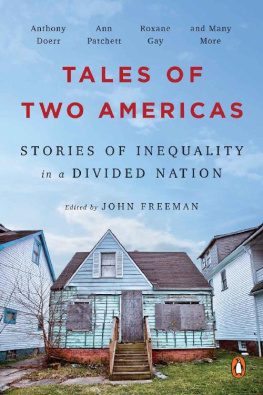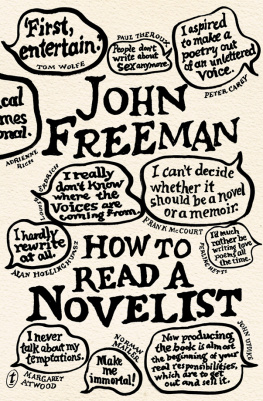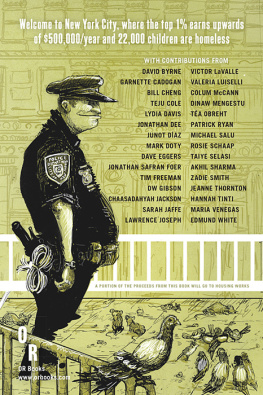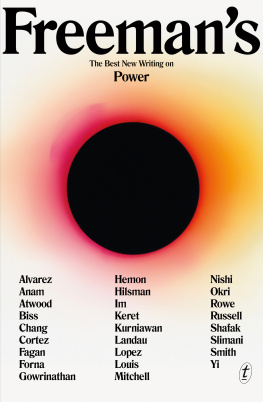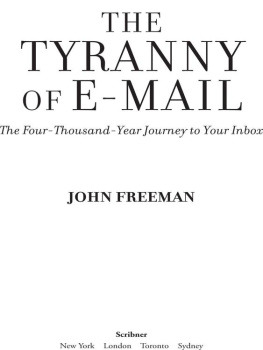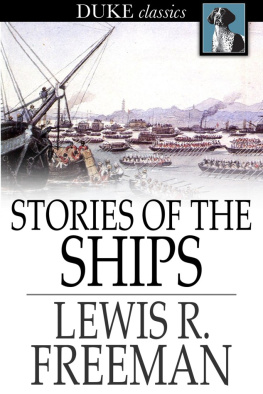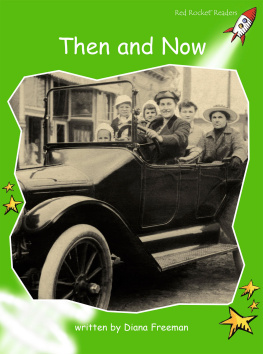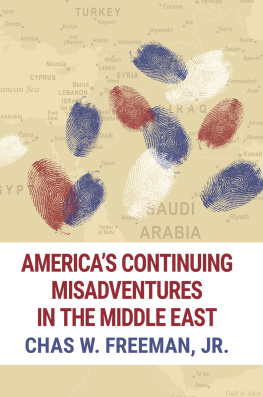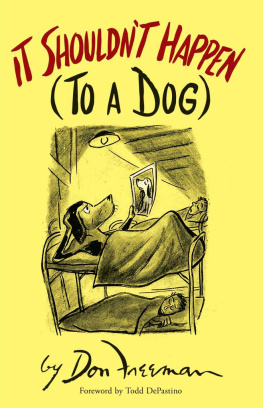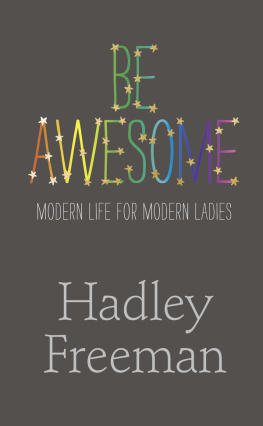John Freeman - Tales of Two Americas
Here you can read online John Freeman - Tales of Two Americas full text of the book (entire story) in english for free. Download pdf and epub, get meaning, cover and reviews about this ebook. year: 2017, publisher: Penguin Books, genre: Science / Art. Description of the work, (preface) as well as reviews are available. Best literature library LitArk.com created for fans of good reading and offers a wide selection of genres:
Romance novel
Science fiction
Adventure
Detective
Science
History
Home and family
Prose
Art
Politics
Computer
Non-fiction
Religion
Business
Children
Humor
Choose a favorite category and find really read worthwhile books. Enjoy immersion in the world of imagination, feel the emotions of the characters or learn something new for yourself, make an fascinating discovery.
- Book:Tales of Two Americas
- Author:
- Publisher:Penguin Books
- Genre:
- Year:2017
- Rating:4 / 5
- Favourites:Add to favourites
- Your mark:
- 80
- 1
- 2
- 3
- 4
- 5
Tales of Two Americas: summary, description and annotation
We offer to read an annotation, description, summary or preface (depends on what the author of the book "Tales of Two Americas" wrote himself). If you haven't found the necessary information about the book — write in the comments, we will try to find it.
Tales of Two Americas — read online for free the complete book (whole text) full work
Below is the text of the book, divided by pages. System saving the place of the last page read, allows you to conveniently read the book "Tales of Two Americas" online for free, without having to search again every time where you left off. Put a bookmark, and you can go to the page where you finished reading at any time.
Font size:
Interval:
Bookmark:
PENGUIN BOOKS
TALES OF TWO AMERICAS
John Freeman is founder of the literary biannual Freemans. He has written two books of nonfiction, How to Read a Novelist and The Tyranny of E-mail, and Maps, a collection of poems. Tales of Two Cities: The Best and Worst of Times in Todays New York, an anthology about inequality in New York, was published by Penguin in 2015. The former editor of Granta, his work has appeared in The New Yorker, The Paris Review, The New York Times, and has been translated into more than twenty languages. He lives in New York City, where he is writer in residence at New York University and teaches at The New School.
A portion of the proceeds from sales of this book will be donated to homeless charities in the United States.

PENGUIN BOOKS
An imprint of Penguin Random House LLC
375 Hudson Street
New York, New York 10014
penguin.com
Published in Penguin Books 2017
Copyright 2017 by OR Books LLC
Penguin supports copyright. Copyright fuels creativity, encourages diverse voices, promotes free speech, and creates a vibrant culture. Thank you for buying an authorized edition of this book and for complying with copyright laws by not reproducing, scanning, or distributing any part of it in any form without permission. You are supporting writers and allowing Penguin to continue to publish books for every reader.
Published by arrangement with OR Books LLC, New York.
constitute an extension of this copyright page.
Ebook ISBN: 9781524704827
LIBRARY OF CONGRESS CATALOGING-IN -PUBLICATION DATA
Names: Freeman, John, 1974 editor.
Title: Tales of two Americas : stories of inequality in a divided nation / edited by John Freeman.
Description: New York : Penguin Books, 2017.
Identifiers: LCCN 2017011506 | ISBN 9780143131038 (paperback)
Subjects: LCSH: Social problemsUnited StatesFiction. | Social justiceUnited StatesFiction. | Social conflictUnited StatesFiction. | United StatesEthnic relationsFiction. | United StatesRace relationsFiction. | Short stories, American.
Classification: LCC PS648.S58 T35 2017 | DDC 813/.0108355dc23 LC record available at https://lccn.loc.gov/2017011506
Cover design: Christopher Brian King
Cover image: Benjamin Lowy / Getty Images, (sky) detchana wangkheeree / Shutterstock
Version_1
This book is for my brother Andy,
who has lived in many countries
INTRODUCTION
John Freeman
L AST WINTER I flew home to Sacramento for a short visit. On a mild December night I slipped on a coat and set out walking from the capitol to a bookstore not far away.
Very quickly, as in most American cities, I was approached and asked for money. Each manand they were all menspoke a reason. Spare some change for the holidays?A dollar for a veteran? Do you have any money for food? Taken in isolation, their requests had a stark, brutal simplicity. They were each a call to basic kindness. Will you see me, will you help? Of course even the most strapped of us has a quarter for a hungry person. So I gave, I always do. I know it is quite possible the reasons were ploys to get money for other things, but I cannot stand the other possibilitywhich is that the need was actual, and dire.
I walked on after speaking to the last man, and approached my destination in a state of dismay and dj vu. I had been traveling a lot that fall and winter and everywhere I went I saw an unkind America. It was a constant refrain in Chicago, in Seattle, in Portland, in Miami: got some change, can you help, got some money for a veteran? Most people walk right by. Somewhat understandably. The only way in which to reside or work in much of America for many is to ignore these requests, in essence to deny our mutual humanity in order to live our lives. My dismay had another source, however. I had actually traveled to Sacramento that December to have an event at Time Tested Books to discuss this very issue of homelessness and inequality in New York. I had just published an anthology called Tales of Two Cities: The Best of Times and Worst of Times in Todays New York, and I decided to walk because some of the most important essays in that book came from walkers, from people who saw New York at a human pace and so saw the stories it was not telling itself.
I thought about it and realized that most of my memories of Sacramento were seen at the speed of a car. I couldnt remember a single walk I had taken with my grandfather, who moved to the city in 1933, and helped build the church we attended; or my father, who was born six years later and grew up downtown; or my brothers, who moved with me to the suburbs of Sacramento from Pennsylvania in 1984. We drove, parked, and walked a short distance to our destination. Now, thirty years later, I was on foot and seeing a very different city, wondering if I had been passing by it all along, or if something important had changed. As I approached Twenty-First Street I began to despair that I had come to Sacramento to speak about New York. Thats when another man dressed in jeans and a work shirt stepped into my path, looking like he might be needing directions. He did: Do you know where the Meals on Wheels truck is, man? he asked.
America is broken. You dont need a fistful of statistics to know this. You just need eyes and ears and stories. Walk around any American city and evidence of the shattered compact with citizens will present itself. There you will see broken roads, overloaded schools, police forces on edge, clusters and sometimes whole tent cities of homeless people camped in eyeshot of shopping districts that are beginning to resemble ramparts of wealth rather than stores for all. Thick glass windows and security guards stand between aspirational goods and the people outside in Portland, Oregon; in San Francisco; in Seattle; Los Angeles; New York; and Miami. The soaring cost of living in these citieswhich have become meccas for luxury and creative economy work, but depend on service labor to run their dream machineshas a lot to do with this state of affairs. Adjusting for rent and costs, the middle-class residents of these cities now have the lowest real earnings of any metropolitan area. And across the nation at large, Americas
This is not just an urban problem. In smaller cities and towns and in rural America the gulf between the haves and have-nots stretches just as wide, even if its symptoms are not so visible. California might be home to more than one hundred billionaireswhose collected assets dwarf the GDP of most nations in the worldbut nearly a quarter of the state is poor. The jobs that were once done by hand are increasingly done by machine. Appalachia, upstate New York, Michiganinequality stretches to almost unthinkable gulfs there too. No matter how much one hears of recovery and new jobs, what those jobs are and what they promise tend to get left out. These jobs are often short-shift work, work without benefits, work so temporary it has created a new term: the precariat. This unease became the pivot point of the 2016 presidential election.
Financial inequality is not just a symptom of bad public policy, though, or something that has emerged only in tandem with the forces of the recent election. It was formed by decades of injustice and structural inequality in America produced by the nations growth on the back of stolen labor, the failure of Reconstruction, the entrenchment of racial bias in the culture, restrictions on immigration and the way immigration law is enforced, the long aftermath of the war on drugs, sexism, gender imbalances, and the complicity of financial services in preying upon populations afflicted by these inequalities with predatory loaning. We also havent introduced meaningful progressive taxation in decades. Whatever benefits the once-robust welfare state ensured have been all but demolished by this deeply enmeshed system of inequality, putting far more at risk than just upward mobility. It has put peoples bodies at risk. Writing in the wake of a lethal police shooting in Charlotte earlier last year, the pastor William Barber II noted: When Charlottes poor black neighborhoods were afflicted with disproportionate law enforcement during the war on drugs, condemning a whole generation to bad credit and a lack of job opportunities, our elected representatives didnt call it violence. When immigration officers raid homes and snatch undocumented children from bus stops, they dont call it violence. But all of these policies and practices do violence to the lives of thousands of Charlotte residents.
Next pageFont size:
Interval:
Bookmark:
Similar books «Tales of Two Americas»
Look at similar books to Tales of Two Americas. We have selected literature similar in name and meaning in the hope of providing readers with more options to find new, interesting, not yet read works.
Discussion, reviews of the book Tales of Two Americas and just readers' own opinions. Leave your comments, write what you think about the work, its meaning or the main characters. Specify what exactly you liked and what you didn't like, and why you think so.

